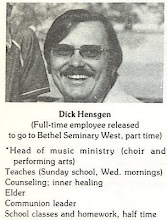 Ken and most of us in leadership at FBCCV looked to the early church as our model. This also seemed to be true for most of the Charismatic Renewal. Since Baptists weren't hooked into any specific liturgy, the spontaneity and liberty of the expressions of the Gifts of the Spirit were seen as signs of authentic worship, in the tradition of the early church. Of course, the liturgical church saw things a little differently, signs of life did not destroy the liturgy. But regardless of our view of liturgical or free, we all looked to the early church, before Constantine.
Ken and most of us in leadership at FBCCV looked to the early church as our model. This also seemed to be true for most of the Charismatic Renewal. Since Baptists weren't hooked into any specific liturgy, the spontaneity and liberty of the expressions of the Gifts of the Spirit were seen as signs of authentic worship, in the tradition of the early church. Of course, the liturgical church saw things a little differently, signs of life did not destroy the liturgy. But regardless of our view of liturgical or free, we all looked to the early church, before Constantine. In this article, Ken discusses the "fall of the church" after Constantine. While the fortunes of the church seemed to improve under Imperial favor, the fervor of the church actually declined. Ken even looked at the creeds, such as the Nicene, with a little jaundice. It isn't necessarily the creed that was bad. It was the fact that the church was beginning to ossify rather than remain malleable under the move of the Spirit. He ends this paragraph with the statement, "It is significant that none of the creeds say anything like 'I believe in living by the Sermon on the Mount.'"
Here again, Ken emphasizes the fact that the church is not to be something used by the government. Whatever your understanding of Constantine and his conversion, Constantine did use the church to forward his political aims. Ken thought that it is important to keep the church free of such use. Separation of Church and State was extremely important. Of course, how this seems now to be interpreted by those in power is another issue. The church is to stand alone. The church is composed of a people committed to the Lordship of Jesus Christ. They are good citizens. They may be involved even in the governing, but the church stands apart. Therefore the church can speak as a moral source into the life of the government. As we will discuss in the next post, the constitution of the church is the Sermon on the Mount.

.jpg)
You're right, Michael, about the Nicene Creed. Actually, I believe the Apostles' Creed was developed as part of the rite of baptism. I was a response to the questions "Do you believe in God the Father," etc.
ReplyDeleteOf course the "theological disputes" that arose later and that Ken Pagaard seems to dismiss were no mere trifles but such core issues as whether Christ is "one in being with the Father" or merely the first among creatures as the Arians held.
On this issue, I think that Ken was just plain wrong.
The response above is from me, Rick Hensgen, not from my dad.
ReplyDelete